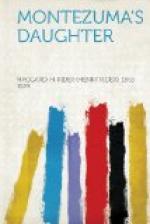And now to my task.
CHAPTER II
OF THE PARENTAGE OF THOMAS WINGFIELD
I, Thomas Wingfield, was born here at Ditchingham, and in this very room where I write to-day. The house of my birth was built or added to early in the reign of the seventh Henry, but long before his time some kind of tenement stood here, which was lived in by the keeper of the vineyards, and known as Gardener’s Lodge. Whether it chanced that the climate was more kindly in old times, or the skill of those who tended the fields was greater, I do not know, but this at the least is true, that the hillside beneath which the house nestles, and which once was the bank of an arm of the sea or of a great broad, was a vineyard in Earl Bigod’s days. Long since it has ceased to grow grapes, though the name of the ‘Earl’s Vineyard’ still clings to all that slope of land which lies between this house and a certain health-giving spring that bubbles from the bank the half of a mile away, in the waters of which sick folks come to bathe even from Norwich and Lowestoft. But sheltered as it is from the east winds, to this hour the place has the advantage that gardens planted here are earlier by fourteen days than any others in the country side, and that a man may sit in them coatless in the bitter month of May, when on the top of the hill, not two hundred paces hence, he must shiver in a jacket of otterskins.
The Lodge, for so it has always been named, in its beginnings having been but a farmhouse, faces to the south-west, and is built so low that it might well be thought that the damp from the river Waveney, which runs through the marshes close by, would rise in it. But this is not so, for though in autumn the roke, as here in Norfolk we name ground fog, hangs about the house at nightfall, and in seasons of great flood the water has been known to pour into the stables at the back of it, yet being built on sand and gravel there is no healthier habitation in the parish. For the rest the building is of stud-work and red brick, quaint and mellow looking, with many corners and gables that in summer are half hidden in roses and other creeping plants, and with its outlook on the marshes and the common where the lights vary continually with the seasons and even with the hours of the day, on the red roofs of Bungay town, and on the wooded bank that stretches round the Earsham lands; though there are many larger, to my mind there is none pleasanter in these parts. Here in this house I was born, and here doubtless I shall die, and having spoken of it at some length, as we are wont to do of spots which long custom has endeared to us, I will go on to tell of my parentage.




